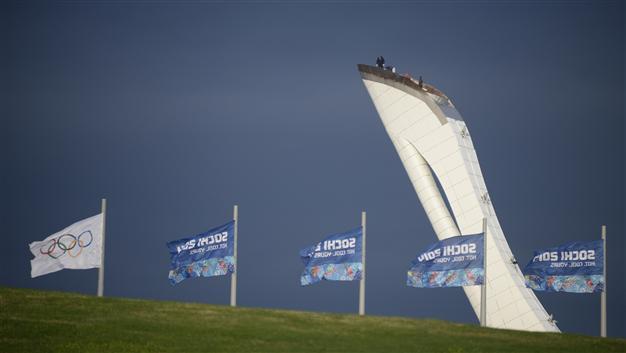Olympic torch in Sochi amid protests over anti-gay law
SOCHI - Agence France-Presse

Technicians work on the olympic torch in the medals plaza in the seaside cluster prior to the start of the 2014 Sochi Winter Olympics on Feb 1. AFP photo
The Olympic torch was due to arrive in Olympic hosts Sochi Feb. 5 two days ahead of the Winter Games opening, on a global day of planned protests against Russia's anti-gay legislation.
Russian President Vladimir Putin was also set to visit athletes settling into the Olympic villages as the authorities rush to make the finishing touches ahead of Friday's opening ceremony in the Fisht stadium.
Putin has vowed that Russia will ensure hospitable and top class Games for everyone but the $50 billion project has long been overshadowed by Russia's law outlawing "gay propaganda" to minors.
Gay rights group All Out is organising protests in 19 cities around the world -- including Saint Petersburg in Russia but not Sochi itself -- urging sponsors to "break their silence" on the controversial legislation.
"This is the moment to push sponsors to use their economic power to call for an end to these discriminatory laws," it said in a statement.
Sponsors target of activistsU.S. telecoms giant AT&T on Feb. 4 joined a growing international chorus of disapproval at the "gay propaganda" law which activists say is vehemently homophobic by definition.
"We stand against Russia's anti-LGBT law," said AT&T, the biggest U.S. cellphone and landline operator, in a blog on its corporate website.
The international demonstrations by LGBT activists plan to target big-name Olympic sponsors such as McDonald's, Coca-Cola, Samsung, watchmaker Omega and Visa credit cards.
The Olympic flame is due to spend the next three days in and around Sochi, including Friday when it will finally arrive at the stadium to light the Olympic cauldron.
The stadium is itself some 40 kilometres south of Sochi city centre and in the next days the flame is expected to be carried by runners, on trains, on sailing boats and even possibly on a Black Sea dolphin.
Flame carriers are set to include U.N. Secretary General Ban Ki-moon and IOC president Thomas Bach as well as luminaries of Russian sport like pole vault champion Elena Isinbayeva.
Putin assured International Olympic Committee (IOC) president Bach the day earlier that all guests would feel comfortable at the Games.
"I want to assure you that we will do everything so that Sochi is a hospitable home for all the participants, for all the guests," Putin told Bach as he met members of the IOC in Sochi.
"The main task is to make the Sochi Games a celebration for all sport lovers in the world," Putin added.
He also thanked the IOC for allowing Russia to host the Olympics when at the time of the bid only 15 percent of the infrastructure was ready. Putin was later expected to visit the Olympic village where he was to take part in the official welcome for the Russian team.
There has been particular concern that not all accommodation for the media has been ready on time with reporters swapping tales of last-minute repairs and non-existent wi-fi.
Security at the Winter Games has also been a major fear with tens of thousands of members of the Russian security forces on duty to ward off the threat of attacks from militants from the nearby Northern Caucasus.
A top U.S. counter-terrorism official said Feb. 4 the biggest security threat facing the games was a possible attack in areas outside of Sochi and its heavily-guarded venues.
Matthew Olsen, director of the National Counter-terrorism Center, said the primary threat came from the Caucasus Emirate, which he described as "probably the most prominent terrorist group in Russia".
President Barack Obama has been assured that the United States is "taking all appropriate steps regarding the safety of Americans" at the February 7-23 games, the White House said.
